|
|
The Holy Prophet Jeremiah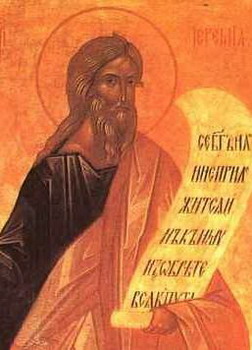 Jeremiah was born about six hundred years before Christ in the village of Anathoth not far from Jerusalem. He began to prophesy at the age of fifteen during the reign of King Josiah. He preached repentance to the king and noblemen, false prophets and priests. During the reign of King Josiah, Jeremiah barely escaped death from the murdering hands of the enraged nobles. Concerning King Jehoiakim, he prophesied that the king's burial would be like the burial of an ass, i.e., his dead body would be tossed outside Jerusalem and that his body would be dragged along the ground without benefit of burial: "He shall be buried with the burial of an ass, drawn and cast forth beyond the gates of Jerusalem" (Jeremiah 22:18). Because of this, Jeremiah was cast into a prison. Not being able to write in prison, Jeremiah invited Baruch (the son of Neriah), who stood near the small window of the prison and dictated to him. When this prophecy was read to the king, the enraged king grabbed the paper and threw it into a fire. Divine Providence saved Jeremiah from prison and the word of the prophet was fulfilled in Jehoiakim. Concerning King Jeconiah (son of Jehoiakim, King of Judah), Jeremiah prophesied that Jeconiah would be taken to Babylon with his entire family and that he would die there. All of which came about shortly: ". . . after that Nebuchadnezzar, king of Babylon, had carried away captive Jeconiah, the son of Jehoiakim, king of Judah" (Jeremiah 24:1). ". . . when he carried away captive Jeconiah, the son of Jehoiakim, the king of Judah from Jerusalem to Babylon, and all the nobles of Judah and Jerusalem" (Jeremiah 27:20). Under King Zedekiah, Jeremiah placed a yoke around his own neck and walked through Jerusalem prophesying the fall of Jerusalem and bondage under the yoke of the Babylonians. "Thus said the Lord to me; Make thee bonds and yokes and put them upon thy neck" (Jeremiah 27:2). "I spoke also to Zedekiah, king of Judah, according to all these words saying, bring your necks under the yoke of the king of Babylon, and serve him and his people, and live" (Jeremiah 27:12). To the Hebrew captives in Babylon, Jeremiah wrote telling them not to hope for a speedy return to Jerusalem for they would remain in Babylon for seventy years, which came to pass. "This whole land shall be a ruin and a desert. Seventy years these nations shall be enslaved to the king of Babylon" (Jeremiah 25:11). In the valley of Topheth near Jerusalem (the Valley of Slaughter), where the Jews offered children as a sacrifice to the idols, Jeremiah took a potter's clay vessel in his hands and shattered it before the people prophesying the impending humbling of the kingdom of Judah. "Even so, I will break this people and this city, as one breaks a potter's vessel that cannot be made whole again" (Jeremiah 19:11). The Babylonians shortly captured Jerusalem, slew King Zedekiah, plundered and destroyed the city, and beheaded a great number of Jews in the Valley of Topheth on the same spot where children were slaughtered for sacrifice to the idols and where the Prophet Jeremiah smashed the potter's vessel of clay. Jeremiah, with the Levites, removed the Ark of the Covenant from the Temple to Mt. Nebo where Moses died and there he hid the Ark in a cave. However, he hid the fire from the Temple in a deep well. Jeremiah was forced by some Jews to accompany them to Egypt where he lived for four years and was then stoned to death by his countrymen. To the Egyptians, Jeremiah prophesied the destruction of their idols and the arrival of the Virgin and the Christ-Child to Egypt. There is a tradition which states that King Alexander the Great visited the tomb of the Prophet Jeremiah. By order of King Alexander, the body of Jeremiah was translated and buried in Alexandria. Jeremiah was born about six hundred years before Christ in the village of Anathoth not far from Jerusalem. He began to prophesy at the age of fifteen during the reign of King Josiah. He preached repentance to the king and noblemen, false prophets and priests. During the reign of King Josiah, Jeremiah barely escaped death from the murdering hands of the enraged nobles. Concerning King Jehoiakim, he prophesied that the king's burial would be like the burial of an ass, i.e., his dead body would be tossed outside Jerusalem and that his body would be dragged along the ground without benefit of burial: "He shall be buried with the burial of an ass, drawn and cast forth beyond the gates of Jerusalem" (Jeremiah 22:18). Because of this, Jeremiah was cast into a prison. Not being able to write in prison, Jeremiah invited Baruch (the son of Neriah), who stood near the small window of the prison and dictated to him. When this prophecy was read to the king, the enraged king grabbed the paper and threw it into a fire. Divine Providence saved Jeremiah from prison and the word of the prophet was fulfilled in Jehoiakim. Concerning King Jeconiah (son of Jehoiakim, King of Judah), Jeremiah prophesied that Jeconiah would be taken to Babylon with his entire family and that he would die there. All of which came about shortly: ". . . after that Nebuchadnezzar, king of Babylon, had carried away captive Jeconiah, the son of Jehoiakim, king of Judah" (Jeremiah 24:1). ". . . when he carried away captive Jeconiah, the son of Jehoiakim, the king of Judah from Jerusalem to Babylon, and all the nobles of Judah and Jerusalem" (Jeremiah 27:20). Under King Zedekiah, Jeremiah placed a yoke around his own neck and walked through Jerusalem prophesying the fall of Jerusalem and bondage under the yoke of the Babylonians. "Thus said the Lord to me; Make thee bonds and yokes and put them upon thy neck" (Jeremiah 27:2). "I spoke also to Zedekiah, king of Judah, according to all these words saying, bring your necks under the yoke of the king of Babylon, and serve him and his people, and live" (Jeremiah 27:12). To the Hebrew captives in Babylon, Jeremiah wrote telling them not to hope for a speedy return to Jerusalem for they would remain in Babylon for seventy years, which came to pass. "This whole land shall be a ruin and a desert. Seventy years these nations shall be enslaved to the king of Babylon" (Jeremiah 25:11). In the valley of Topheth near Jerusalem (the Valley of Slaughter), where the Jews offered children as a sacrifice to the idols, Jeremiah took a potter's clay vessel in his hands and shattered it before the people prophesying the impending humbling of the kingdom of Judah. "Even so, I will break this people and this city, as one breaks a potter's vessel that cannot be made whole again" (Jeremiah 19:11). The Babylonians shortly captured Jerusalem, slew King Zedekiah, plundered and destroyed the city, and beheaded a great number of Jews in the Valley of Topheth on the same spot where children were slaughtered for sacrifice to the idols and where the Prophet Jeremiah smashed the potter's vessel of clay. Jeremiah, with the Levites, removed the Ark of the Covenant from the Temple to Mt. Nebo where Moses died and there he hid the Ark in a cave. However, he hid the fire from the Temple in a deep well. Jeremiah was forced by some Jews to accompany them to Egypt where he lived for four years and was then stoned to death by his countrymen. To the Egyptians, Jeremiah prophesied the destruction of their idols and the arrival of the Virgin and the Christ-Child to Egypt. There is a tradition which states that King Alexander the Great visited the tomb of the Prophet Jeremiah. By order of King Alexander, the body of Jeremiah was translated and buried in Alexandria.The Venerable Martyr Acacius, the sandal-makerAcacius was from the village of Neochorion near Thessalonica. Mistreated greatly by his master craftsman in Serres, Acacius converted to Islam. Later (he returned to the Faith) and as a penitent and monk, he lived in the Monastery Hilendar (Mt. Athos). His needy and Christ-loving mother counseled him: "As you willingly denied the Lord, so now you must willingly and bravely accept martyrdom for the Sweet Jesus." The son followed the advice of his mother and with the blessings of the fathers of the Holy Mountain, Acacius traveled to Constantinople where the Turks beheaded him on May 1, 1816 A.D. His head is preserved in a reliquary in the Russian monastery, St. Panteleimon on Mt. Athos.
The Venerable Paphnutius of Borovsk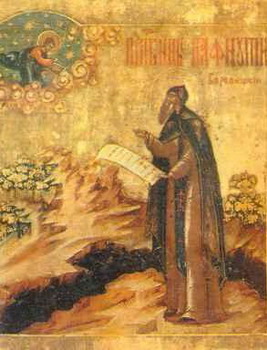 Paphnutius, the son of a Tartar nobleman, later embraced the Christian Faith. At age twenty, Paphnutius was tonsured a monk and continued to live his life in a monastery until his ninety-fourth year, when he reposed in the Lord. Paphnutius was a virgin and an ascetic. Because of this, he became a miracle-worker and discerner. He died in the year 1478 A.D. Paphnutius, the son of a Tartar nobleman, later embraced the Christian Faith. At age twenty, Paphnutius was tonsured a monk and continued to live his life in a monastery until his ninety-fourth year, when he reposed in the Lord. Paphnutius was a virgin and an ascetic. Because of this, he became a miracle-worker and discerner. He died in the year 1478 A.D.Martyr Batas of Nisibis (395)The Martyr Bata, a monastic, lived during the IV Century in Persia and asceticised there in one of the monasteries. During a time of persecution against Christians, initiated by the Persian emperor, the holy martyr was killed in the city of Niziba for confessing the Christian faith.
Venerable Nicephorus of Chios, monk (1821)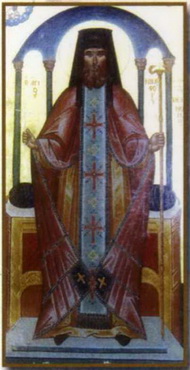 Saint Nicephorus, the “most luminous star of the Church of Christ,” who delighted the hearts of the faithful “with divinely inspired teachings,” was born around 1750 at Kardamyla on the Greek island of Chios, and his family name was Georgios, or Georgos. When he was still very young, he became sick with a pestilential disease. His parents vowed that if he recovered, they would offer him to the Mother of God to serve Her at the famous Byzantine monastery of Nea Moni, which was dedicated to Her. He did get well, and so the parents took him to the monastery, where he was placed under the guidance of the venerable Elder Anthimus Hagiopateritis... Saint Nicephorus, the “most luminous star of the Church of Christ,” who delighted the hearts of the faithful “with divinely inspired teachings,” was born around 1750 at Kardamyla on the Greek island of Chios, and his family name was Georgios, or Georgos. When he was still very young, he became sick with a pestilential disease. His parents vowed that if he recovered, they would offer him to the Mother of God to serve Her at the famous Byzantine monastery of Nea Moni, which was dedicated to Her. He did get well, and so the parents took him to the monastery, where he was placed under the guidance of the venerable Elder Anthimus Hagiopateritis...St. Panaretus, archbishop of Paphos in Cyprus (1791)Hieromartyr Macarius, metropolitan of Kiev (1497)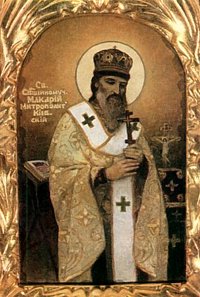 The PriestMartyr Makarii, Metropolitan of Kiev, was earlier the archimandrite of the Vilensk Holy Trinity monastery. In 1495, after the death of the Kiev metropolitan, Jona with the Ankle, Makarii was chosen and ordained in his place by an assembly of hierarchs: Vassian of Vladimir, Luke of Polotsk, Vassian of Turov and Jona of Lutsk... The PriestMartyr Makarii, Metropolitan of Kiev, was earlier the archimandrite of the Vilensk Holy Trinity monastery. In 1495, after the death of the Kiev metropolitan, Jona with the Ankle, Makarii was chosen and ordained in his place by an assembly of hierarchs: Vassian of Vladimir, Luke of Polotsk, Vassian of Turov and Jona of Lutsk...Martyr Sabbas (1821)
Martyr IsidoraVenerable Gerasimus, abbot of Boldino (1557)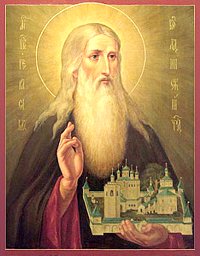 The Monk Gerasim of Boldinsk, in the world Grigorii, was born in 1490 at Pereslavl'-Zalessk. In early childhood he frequented the church of God. Having learned about the holy life of the Monk Daniel of Pereyaslavl', the 13 year old Grigorii with tears besought the starets-elder to let him join him. The starets accepted the boy as a novice and in a short while gave him monastic tonsure with the name Gerasim. The newly-made monk zealously fulfilled the deeds of fasting and prayer, and soon he was known about in Moscow as a strict ascetic... The Monk Gerasim of Boldinsk, in the world Grigorii, was born in 1490 at Pereslavl'-Zalessk. In early childhood he frequented the church of God. Having learned about the holy life of the Monk Daniel of Pereyaslavl', the 13 year old Grigorii with tears besought the starets-elder to let him join him. The starets accepted the boy as a novice and in a short while gave him monastic tonsure with the name Gerasim. The newly-made monk zealously fulfilled the deeds of fasting and prayer, and soon he was known about in Moscow as a strict ascetic...Saint Tamar the Great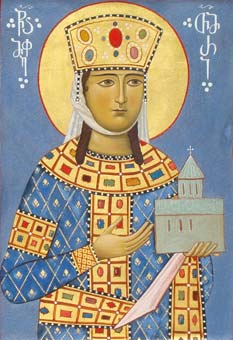 Tamar was proclaimed heir and co-ruler by her reigning father George III in 1178, but she faced significant opposition from the aristocracy upon her ascension to full ruling powers after George's death. Tamar was successful in neutralizing this opposition and embarked on an energetic foreign policy aided by the decline of the hostile Seljuq Turks. Relying on a powerful military élite, Tamar was able to build on the successes of her predecessors to consolidate an empire which dominated the Caucasus until its collapse under the Mongol attacks within two decades after Tamar's death. Tamar was proclaimed heir and co-ruler by her reigning father George III in 1178, but she faced significant opposition from the aristocracy upon her ascension to full ruling powers after George's death. Tamar was successful in neutralizing this opposition and embarked on an energetic foreign policy aided by the decline of the hostile Seljuq Turks. Relying on a powerful military élite, Tamar was able to build on the successes of her predecessors to consolidate an empire which dominated the Caucasus until its collapse under the Mongol attacks within two decades after Tamar's death. |